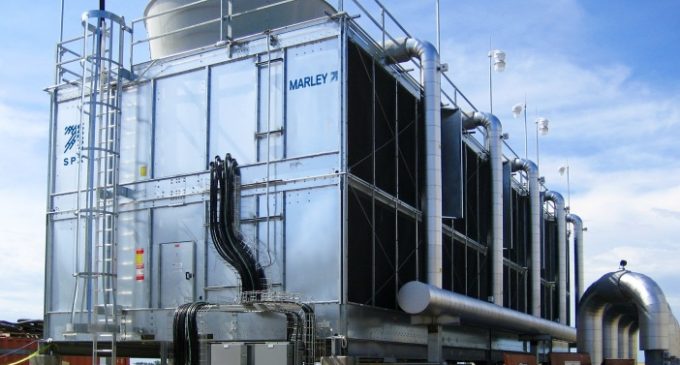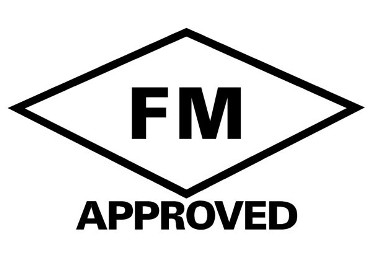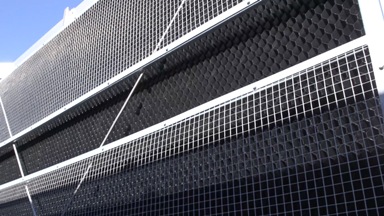How FM APPROVED Cooling Towers Help Reduce Risks

By Scott Maurer, Global Product Manager, SPX Cooling Technologies, Inc
When water flow is temporarily suspended, as in the event of a fire, some cooling towers that contain combustible materials and dry areas may be at risk. Some organizations practice loss prevention by considering an FM APPROVED cooling tower to potentially reduce structural damage and interruption of business.
Consider an FM APPROVED cooling tower to reduce risk
Cooling towers may contain a variety of combustible material, including polyvinyl chloride (PVC) fill, fiberglass reinforced polyester (FRP) casing, fan stacks, fan decks, fan blades, and acrylonitrile butadiene styrene (ABS) and polypropylene nozzles, as well as wood and fiberglass structural components. Functioning cooling towers may also contain dry areas that could catch on fire when water flow is temporarily suspended during maintenance or repairs involving electrical work or welding. In addition, fire damage in cooling towers can extend to the tower’s adjacent cells and to nearby buildings or equipment.
To avoid these risks, consider selecting an FM APPROVED cooling tower. FM Approvals is a nationally recognized testing laboratory and international leader specializing in the testing and certification of property loss prevention products and services. The company is a business unit of FM Global, a worldwide commercial and industrial property insurance company that specializes in loss prevention engineering for one of every three Fortune 1000 companies.
Products that earn the FM APPROVED mark meet FM Approvals’ rigorous loss prevention standards of quality, technical integrity and performance. In addition to cooling towers, FM Approvals tests detection, fire alarm and signaling equipment; ducts, pipe and duct insulation; and combustion control equipment, among many other categories.
FM APPROVED cooling towers are increasingly specified or required for projects around the world. For example, cooling tower specifications at several major US universities require that “cooling towers be FM APPROVED” and “cooling towers with sprinkler systems are not acceptable” as an alternative. Additionally, facility owners’ insurance companies may recommend FM APPROVED towers to reduce potential property loss.
FM APPROVED cooling tower certification process
To become FM APPROVED, cooling towers must meet the requirements outlined in the Approval Standard for Cooling Towers, Class Number 4930, a comprehensive standard, last updated in 2016, that covers all types of tower design, including single-cell, multi-cell and rooftop-installed towers.

FM Approved logo – FM APPROVED towers display this logo when the entire system passes stringent test criteria. In addition to fire tests, the FM Approval process includes vendor and manufacturer audits, cyclic wind pressure and missile testing, as well as reviews of structural calculations, seismic calculations and material formulations.
As part of its approval process, FM Approvals performs a full-size product fire test. This involves burning one or two complete cooling tower cells in a prescribed manner that is witnessed by representatives of FM Approvals. To pass the burn test, the tower must be capable of operating at a reduced design capacity after a fire. Requirements vary based on whether single-cell or multi-cell approvals are sought. In addition, the fire must not propagate within or beyond the cell. Cooling tower manufacturers can submit for testing any combination of materials to evaluate performance. In addition to fire tests, the FM Approval process includes vendor and manufacturer audits, cyclic wind pressure and missile testing, as well as reviews of structural calculations, seismic calculations and material formulations.
For example, SPX Cooling Technologies, Inc., a leading global manufacturer of cooling towers and specialized heat exchangers, has a well-established relationship with FM Approvals. In the 1970s, The Marley Company (now SPX Cooling Technologies) approached FM Approvals to develop a protocol to test product differentiation based on fire resistance. Over 40 years later, Marley-brand cooling towers from SPX continue to offer several cooling tower design series that carry FM APPROVED certification, including factory-assembled products such as the Marley® NC, Marley NC Everestä, Marley MD and Marley AV Cooling Towers, and the Marley MH Fluid Cooler.
It is worth noting that FM Approval applies only to the entire cooling tower package. Individual components, such as the heat transfer fill media, cannot be labeled as “FM APPROVED” or be considered as having improved fire safety if installed in a cooling tower that is not FM APPROVED. A cooling tower that does not have FM Approval cannot be considered FM APPROVED simply by adding fill materials from an FM APPROVED model. In addition, replacement components for FM APPROVED towers must come from the original equipment supplier with current FM APPROVED status for the cooling tower to continue to be FM APPROVED.
Benefits of FM Approvals
The FM APPROVED mark on a product implies a high level of reliability by requiring manufacturers to meet enhanced equipment design standards and hazard exposure testing. The rigorous FM Approvals standards indicate the quality of these towers, which differentiates them from others in the market that are not FM APPROVED.
FM Approvals certification ensures that in the event of a fire, the cooling tower system will continue to function at a reduced design capacity, allowing critical business operations to continue while recovery is underway. FM APPROVED rooftop towers must demonstrate that they prevent burning debris from falling onto the roof surface.

Air inlet – An air inlet screen helps qualify a cooling tower as FM APPROVED, because in the event of a fire, it keeps fill materials and debris contained within.
In addition, FM APPROVED cooling towers do not require the installation of an automated sprinkler system. Installation and maintenance of external sprinkler systems can be costly to owners. In the rare event of a fire, it is expected that the automatic sprinkler system would function as designed and fire would not spread to adjacent cells. In an FM APPROVED cooling tower, the fire is contained in the cell where it originated, allowing the rest of the cooling tower cells to continue operating. This can be especially important in critical applications like hospitals, district cooling applications, data centers and power plants that cannot risk an unplanned outage. By choosing an FM APPROVED cooling tower, owners can avoid the costs and maintenance associated with external sprinkler systems, while reducing costly interruption of business in the case of a fire.
FM APROVED cooling towers are logical considerations for facility owners who do not wish to install a secondary sprinkler fire protection system, owners concerned about damage due to fires and natural hazards, and owners who cannot tolerate interruptions to operations.
FM APPROVED cooling tower options
SPX Cooling Technologies offers Marley® NC® Series cooling towers, including the only FM APPROVED single-cell crossflow cooling tower on the market. Large-capacity factory-assembled cooling towers such as the NC Everest™ tower offer a viable alternative to field-erected towers. This tower is FM APPROVED for use without a fire protection system.
FM APPROVED cooling towers can reduce the risk of property damage due to fires and natural hazards and may reduce build time as the installation of a sprinkler system may not be required. This makes the use of an FM APPROVED cooling tower an important consideration when choosing a cooling tower for a broad range of critical applications in comfort and process cooling.
























